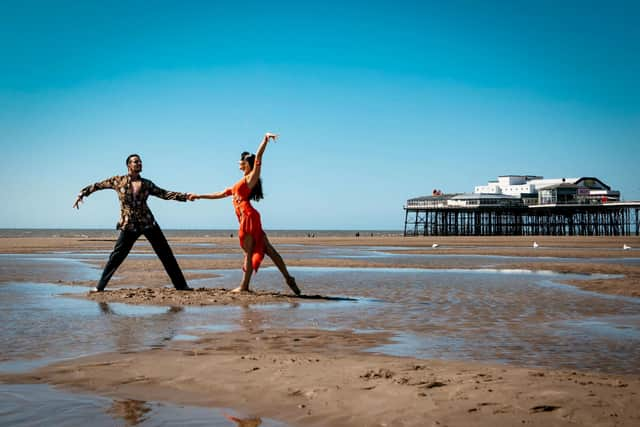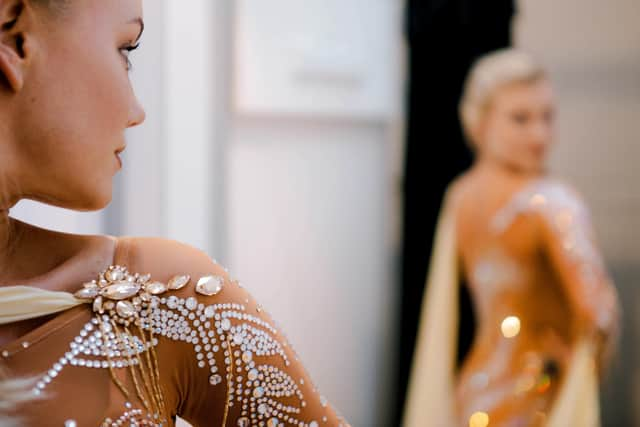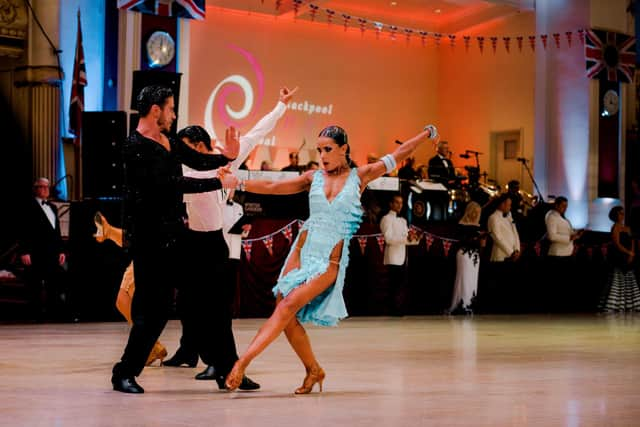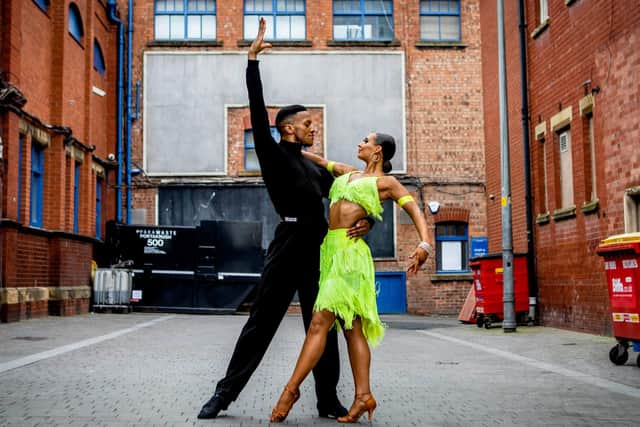Stacey Dooley and Blackpool's Dance Fever: Where and when BBC will screen Strictly Come Dancing star's new documentary following stars of British Open Championships
and live on Freeview channel 276
The event, considered the ‘Wimbledon’ of ballroom and Latin dance, takes place at the Blackpool Dance Festival annually – but this is the first time it has been followed by TV cameras.
The announcement coincides with news Strictly Come Dancing itself will return to Blackpool Tower Ballroom after a hiatus of two years, coinciding with the BBC’s centenary celebrations.
Advertisement
Hide AdAdvertisement
Hide AdThe show also comes days after Dooley announced she is expecting her first child with former Strictly professional Kevin Clifton.


Blackpool’s Dance Fever is the behind-the-scenes story of Latin and Ballroom in Blackpool – waltz and all… and a front-row seat to see how Strictly Stars are born.
It’s a truly international event with dancers from more than 60 countries bringing passion and glamour, tears, triumphs and tribulations – plus gallons of fake tan and hair spray.
The show follows and their dreams to Blackpool, to see exactly what it takes to become the very best.
Advertisement
Hide AdAdvertisement
Hide AdAlong the way the show showcases Latin dancers preparing for this year’s Blackpool, like south Londoners Oskar and Lauren. An accountant and estate agent by day, at night they transform into sizzling samba dancers.


Rebecca and Lloyd from Wales are competing against Tal and Ilana from New Jersey - all desperate to be finalists in the Amateur Latin competition. And South African Darren and his Ukrainian girlfriend Marina want a top place in the Professional Latin event which is the crème de la crème.
Blackpool’s ballroom and Latin heritage is a Great British success story; the iconic ballrooms at the Winter Gardens and the Tower have inspired dancers for more than a century. And just as Blackpool’s has worldwide renown when it comes to dancing, so do British coaches, who work behind the scenes to prepare dancers for Blackpool.
We meet 16-times World Champion Donnie Burns, from Scotland, known as the King of Latin. Dancers from around the world flock to his LA home for lessons. Fellow Brit, Richard Porter, teaches in Florida. Richard coached Strictly Stars like James Jordan, Neil Jones and Katya and Amy Dowden.
Advertisement
Hide AdAdvertisement
Hide AdThe show will be screened at 8pm on Monday, August 29 on BBC One and iPlayer.


We chat to Lauren and Oskar:
When you were approached to be in the show what were your initial thoughts, and what made you want to take part?
Lauren: We were so excited when we were first approached by the World Dance Council to take part in the show. Initially we wondered how it would be possible to condense the entire process into one show! However, any opportunity to shine a light on the dance world is an honour, particularly given that we are a mixed heritage couple, which you don’t often see.
Oskar: To be able to show the true behind the scenes action during the lead up to the biggest Ballroom competition in the world was thoroughly enjoyable and rewarding.
Advertisement
Hide AdAdvertisement
Hide Ad

What was it like being followed by the cameras for the show and being part of the programme?
Oskar: It was almost surreal! You felt like a movie star in Blackpool and you could see the other dancers in the competition wondering why we had cameras following us! I think
because it was something we are genuinely passionate about, we were happy to show it, and it made the experience so much more worthwhile. You know that everything you do and say will be on camera so it was an added pressure but it worked well, and the crew were so helpful, and Stacey was really lovely.
Lauren: It was really interesting seeing what goes on behind the camera, because you’d never know from watching the documentary. The crew were so lovely. Walking through Blackpool high street, in a yellow fluorescent dress, with cameras was the funniest moment!
Advertisement
Hide AdAdvertisement
Hide AdWhat was it like working with Stacey Dooley, who exec produced the doc?
Lauren: Lovely, it was great! We didn’t even know it was with Stacey at first and when we found out we were so shocked.
Oskar: It was such a shock, but she is so lovely and down to earth and she was so interested and enthusiastic, obviously because she has done Strictly Come Dancing and won it, I think there’s a vested interest there for her, and working with her was such a genuinely brilliant experience.
Blackpool’s Dance Fever follows your journey performing in the Amateur Latin Rising Star competition. Without giving anything away, how was it?
Advertisement
Hide AdAdvertisement
Hide AdLauren: Great! We had Europeans the month before and we loved every minute of that, so we couldn’t wait to get back to it. There was a bit more pressure because we had our trainers there this time, and the first round is always a bit tougher as you have to get into it, but we loved every minute.
Oskar: The great thing was that we felt like we were really rehearsed and ready to go and I think that when we actually got onto the floor, we felt comfortable, we felt we could do it, and we felt that we could properly express ourselves. It’s so much better when you don’t have to think about what you're doing, and you're just able to get on the dance floor and perform, as that’s when you do your best. It was one of the first times where we’ve really gone out and just flourished and enjoyed what we’re doing.
How did you get into dancing and what do you love about it?
Lauren: I got into dancing because my sister was doing it and I was really shy when I was young, so I would just sit on the stage and wait for her to finish but then I finally plucked up the courage at about five or six years old to do it myself and loved it ever since. I’ve always been so competitive and wanted to win everything I do, and I think that;s what has kept me going for so long. Dancing is in my blood now, I couldn’t imagine my life without it.
Oskar: She’s not shy now! I was quite late to start dancing, I was about 13 and the reason I started was because I watched it on TV and loved seeing all the lifts. I thought I’d go along and see if I could do it and I really enjoyed learning how to dance and learning the process of it, but when I asked if we were able to do any lifts I remember my coach specifically saying that, that was a completely different style of dance! But I loved it enough that I wanted to continue learning anyway.
How did you find each other and become dance partners?
Advertisement
Hide AdAdvertisement
Hide AdOskar: It was just before COVID happened and we had both split with our previous partners, and were looking for new ones, John and Jane who are our main coaches contacted us and said ‘you two are going to dance together’, and didn’t really give us much choice in the matter!
Lauren: Oskar is a bit older than me, so he used to go into the different age categories in competitions, but we’ve known each other and been in the same studio for years.
Oskar: Now we’re both in the amateur category, it made sense for us to partner up and the rest is history really and we are very lucky to have each other!
Was this your first time competing at Blackpool?
Oskar: No, we were there a month before for the European Championship, and then a couple of months earlier I did the British National Championships. This was our second open British dance competition together so we’ve been to Blackpool quite a few times now.
Advertisement
Hide AdAdvertisement
Hide AdWhat is it like performing at Blackpool compared to other venues?
Oskar: Blackpool is a purpose built venue for what we are actually doing, not a space that has badminton on at 3pm then ballroom and Latin at 7pm! It just gives you that incentive to dance a bit better and we’ve physically felt our performance lift up when we’ve danced in Blackpool because of the venue, the audience, the music being live, there’s so many factors that come into it that just make it so much more of a grand event. And then after that, at some of the Sunday circuit comps, you can just see physically how much the performance drops just because it’s not the same as being at Blackpool and you get the Blackpool blues! The atmosphere when we started this year was electric, before the first round of the Rising Star everyone just started clapping, it’s a really great venue and a really big deal to perform there.
Lauren: It is so much better! Our Sunday circuit comps are sometimes in sports halls and you have the basketball court lines all there, so going to Blackpool is where we feel we belong.
Why do you think Blackpool is so important to the dancing community?
Advertisement
Hide AdAdvertisement
Hide AdOskar: If you think of every other sporting event, football has it’s World Cup, tennis has Wimbledon. It’s dancing’s most iconic competition because it has that legacy, and it doesn’t matter if you’re a dance competitor, dance enthusiast, or you’ve just watched Strictly, when you mention Blackpool, everyone knows immediately what you’re talking about. It’s so associated with ballroom dancing, and I think because of the history of the competition, everyone wants to win that competition, and to be there taking part.
Lauren: It’s the history behind it, where it’s come from, how its developed, and the fact dancers from all over the world travel to compete there. We are so lucky that we have it in our country.
How is it physically sharing the floor with so many other couples?
Oskar: Fortunately, we have excellent floor craft because we are really well trained so we don’t bash into others.
Lauren: It is like an obstacle course though!
Advertisement
Hide AdAdvertisement
Hide AdOskar: Limbs are flung at you left, right and centre and you just have to dodge them, and if you don’t have floor craft, you can end up bumping into people and if you get fazed by things like that it can ruin your performance.
Lauren, do you enjoy all the glitz and glamour of getting dressed for competitions?
I don;t mind it, don’t get me wrong it’s nice to put nice dresses on and things like that but to be honest it’s the bit that’s my least favourite, a lot of girls love it, but for practice I’m
trousers all the time. I just love the sport, and the dancing and it’s just the end product to me, something you have to do, but I do love the fake tan!
Advertisement
Hide AdAdvertisement
Hide AdOskar in the programme, you mention that there aren’t many black competitors within ballroom. Why do you think that is?
I think it comes down to two main factors, the culture around the perceptions of black and African Caribbean origin families, when it comes to dancing because it’s not really seen as a sport that you do, or seen as a career so there’s a bit of a stigma around it culturally. I think diversity is at the core of a lot of other sports, right now we are celebrating the England women’s football team winning the Euro’s, a couple of years ago that really wasn’t the case and as widely recognised. Other sports have opened up the doors so much to embrace diversity, that I think the ballroom and Latin team have been a little bit left behind in that regard. Financially as well, it is an expensive hobby to have, when it comes to families having to think about what they have to prioritise, ballroom dancing properly is not going to be something that is a priority.
What do you think can be done to change this?
We are fortunate enough to be sponsored by a company that have picked up on the diversity aspect of ballroom dancing and they have released a range of women’s shoes that match different skin tones and so you go along and get a pair that actually match your skin tone as opposed to the standard tan ones that you’d get previously. Showing that dancing really is for absolutely everyone. I think TV shows like Strictly Come Dancing really help. Last year they had Rhys and AJ who were not only competing but doing really well, and when you have black professionals like Johannes Oti and Cameron and people on the judging panel, it is the representation aspect that is really important, that you will see on Strictly but not so much in the competitive industry. Hopefully people can take inspiration from all of that and use that to feel like empowered to actually take part and participate.
Would you ever want to take part in Strictly Come Dancing?
Lauren: Of course, we’ve asked each other this and we think it would be a brilliant opportunity.
Advertisement
Hide AdAdvertisement
Hide AdOskar: I think it’s such a great opportunity, it’s a huge television show for the BBC, but I think we have so much we want to do competitively still and so much we want to achieve but if the opportunity ever came along we’d love to do it.
You both have full time jobs, which is unusual for competitive dancers as your level, can you tell me a little bit about these?
Lauren: I work as an estate agent, full-time on the letting side of things, Tuesday to Saturdays which works well with dancing because competitions are usually Sundays. It funds dancing, so I’ll do my job, and then get straight in the car and come to the studio after.
Oskar: I’m a chartered accountant and I work in internal audit, it’ss a very stable job and just like Lauren said it helps to fund the dancing. When COVID happened a lot of dancers weren’t able to continue their careers, they just couldn’t fund it during that time, so having the job really came into its own at that point. I think it also gives you a well-rounded perspective of life as well, that there are things outside of the world of dancing that you have to be conscious of, and it just makes things realistic. When we go to a competition on Sunday, we’ll get good or bad results but whatever happens, on Monday morning we have to wake up and just face the reality of the world. So it just keeps you very grounded.
Advertisement
Hide AdAdvertisement
Hide AdLauren: The crew were really surprised at how normal we both are and it’s because we live in both worlds so it is nice to have that balance. we don’t have the luxury to spend eight hours a day practising so we definitely have to be more disciplined in what we need to get done in those couple of hours we have in the evenings. I finish work at five o’clock then I drive straight to London then we’re dancing till about 10 o’clock sometimes. I would like to go full time dancing eventually but you need to get to a certain point results wise to do that, but it’s definitely on the cards in the future. Hopefully,